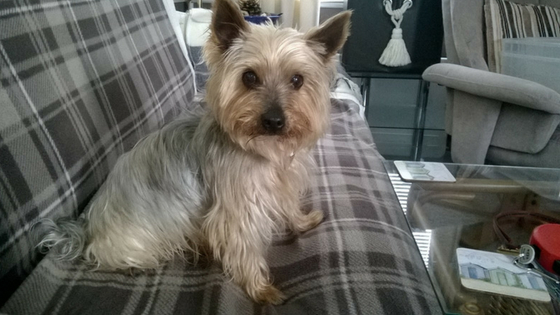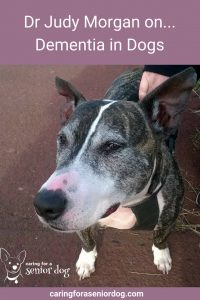
I can’t think of anything more rewarding than making the last years of a pet’s life the absolute best they can be. There are many issues that may need to be addressed as our pets age, including mobility, pain, changes in vision and hearing, cognition or senility, dental care, incontinence, cancer, and changes in appetite and nutritional needs.
Many seniors have changes in mental status us they age, but owners may or may not recognize the changes as being  signs of cognitive dysfunction. The most common clinical signs of “senility” include increased total amount of sleep during a 24-hour period, decreased attention to surroundings, disinterest, apathy, decreased purposeful activity, loss of formerly acquired knowledge (including elimination behaviors), and intermittent anxiety shown as apprehension, panting, moaning, or shivering.
signs of cognitive dysfunction. The most common clinical signs of “senility” include increased total amount of sleep during a 24-hour period, decreased attention to surroundings, disinterest, apathy, decreased purposeful activity, loss of formerly acquired knowledge (including elimination behaviors), and intermittent anxiety shown as apprehension, panting, moaning, or shivering.
There are some easy ways to help our pets maintain good mental health and slow their decline into dementia. These can include the use of puzzles or games that require the animals to find a hidden treat. Nina Ottosson and Kong toys are great examples. They come in different levels of complexity and the level of difficulty can be increased as the pet learns how to work the puzzles.
There are many supplements that can increase brain activity and slow the signs of senility. One of my favorites is coconut oil. Coconut oil improves brain energy metabolism and decreases amyloid protein buildup that causes brain lesions in older dogs. I usually feed 1 teaspoon per 20 pounds of body weight twice daily. Work up to this dose gradually, as stools may soften at higher doses. Be sure to feed cold pressed, organic coconut oil.
Phophatidylserine, a natural phospholipid, improves memory and cognition. This can be found in many supplements available on the market. Dosing is generally 25 to 100 mg per day, depending on size of the pet.
Sam-e, or adenosyl, is an antioxidant that supports brain health and improves sleep quality and memory. Dosing ranges from 90 mg daily for small dogs and cats, up to 425 mg for large dogs. This should be given on an empty stomach.
Omega 3 fatty acids decrease inflammation, improve cognition, and lower blood pressure and triglycerides, all of which improve brain health by improving heart health and circulation. There are many omega 3 fatty acid products on the market. I prefer products sourced from the Scandinavian waters or New Zealand, as these tend to be the cleanest.
A product call Neutricks, contains Apoaequorin, which replaces calcium-binding proteins and helps protect brain cells during the natural process of aging.
For dogs with anxiety, melatonin can be used to improve sleep and decrease anxiety. This can be given at bedtime or twice daily, if needed. A dose of 3 mg is sufficient for most pets.
Feeding a species-appropriate diet is critically important for senior pets. Grass-fed and free-range meats are higher in omega 3’s and lower in bacterial contamination. Organic, dark leafy greens will support liver function and circulation, while providing B vitamins that are necessary for brain function. Vegetables should be finely ground or lightly cooked in coconut oil to release the nutrients needed.
Caring for senior pets may require a little more work, but they can remain happy and healthy for many years, continuing to bring joy to our lives. Go give your senior a hug!
This post was kindly written by Dr. Judy Morgan. Dr. Morgan is a nationally renowned author and veterinarian certified in acupuncture, food therapy, and chiropractic care for dogs, cats, and horses. As a sought after speaker, Dr. Morgan shares her insight with weekly blogs, podcasts, and videos! Visit her website at drjudymorgan.com.
**There are affiliate links in this post, which means if you purchase anything I make a few pennies…literally. That money helps me help homeless animals through donations and fostering, as well as keeping this blog running. **

 Wearable Pet Urns
Wearable Pet Urns
Leave a Reply